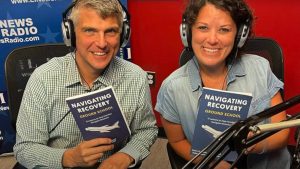
The Deep Valley
There’s usually a deep valley between use and recovery. It can be difficult for families to understand their loved one’s reluctance to get sober. To help them visualize what someone suffering from addiction is facing when they contemplate getting sober, I like to use two analogies: the aftermath of a tornado and being in jail.
When a tornado is about to hit a community, people seek shelter in the basements of their homes. After the tornado passes, people come upstairs and survey the damage. Working together, the community will begin cleaning up, clearing downed trees, and repairing roofs.
Addiction drives people into their basements. They may spend a lot of time down there. When they do come upstairs and look around, they observe what has changed. While their yard is still a mess, their neighbors have cleaned up and moved on with their lives. Sometimes, particularly with addiction, the feeling of being behind doesn’t make someone motivated to catch up. Seeing how much work they have to do, the person struggling with substance use may just want to retreat to the basement and hide from all of the activity.
The Pull of Addiction
Active addiction makes people fall behind. They may have delayed going to school, quit their job, lost their friends. While they were hiding in the basement, their friends got married, started families, and building careers. The suffering person sees this and wants to hide again. When they survey all the damage that their addiction caused and realize how much work recovery is going to be they give up and continue to drink.
This is why recovery takes time, and sometimes therapy. People need time to make a new plan for their lives, and they need time to catch up.
My second analogy to the experience of addiction is that of being locked up in jail. (While I’ve never been there myself, thankfully, I have watched my fair share of “locked up” shows on Netflix). When someone is in jail, they must take on a new persona. Acting the part of the tough guy, they change the way they walk, they choose their friends carefully, they shape their identity to survive in this challenging environment.
Losing Focus and Identity
In addiction, similar preservation tactics are adapted. The person struggling with substance use will be preoccupied with how to get money to buy drugs or alcohol, make friends that support their lifestyle, find a living situation that enables their use. They tell lies to continue to use. To use successfully over a long period of time, the suffering person adopts an entirely new persona. One built around using, and one that loved ones may not even know exists.
Having trouble to adjusting to life outside of jail is a common story. Everything that the person was familiar with may have changed: people got married, had kids, got promoted. When someone is trapped inside the cell of addiction, suddenly aware of everything that has changed on the outside, going from addiction to recovery can seem like an insurmountable task.
Recovery is the Journey Between the Two
Recovery isn’t as easy as “just stopping” drinking or drug use. In most cases, the person did a lot of damage and lost a lot of opportunities. When a suffering person takes a survey of how far they have to go, from living in a basement or a jail cell to being a successful member of society. That change can feel very intimidating, if not an impossibly deep valley to cross.
About Adam Banks
Adam Banks is a certified interventionist and the owner of Adam Banks Recovery. After receiving an MBA from the University of Chicago, Adam built a company acquired by United Health Care. His discipline and attention to detail comes from his former career as an airline pilot, holding an ATP, the FAA’s highest license.
Today, Adam is dedicated to helping others achieve long-term sobriety. His work has guided executives, pilots, and physicians on paths to recovery. Adam brings families together through a loving and inclusive approach.
Adam has authored four books on addiction. His recent work, Navigating Recovery Ground School: 12 Lessons to Help Families Navigate Recovery, educates families on the entire intervention process. He also offers a free video course for families considering an intervention for a loved one.
Adam is available for alcohol and drug intervention services in New York, Long Island, the Hamptons as well as nationally and internationally.




